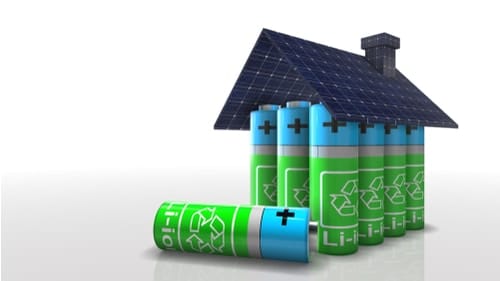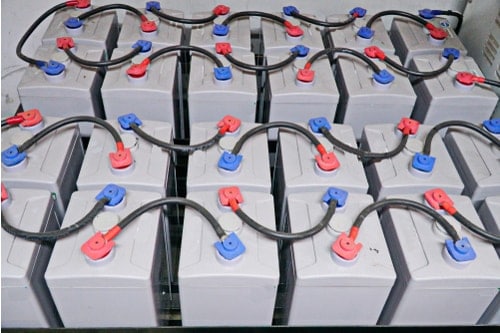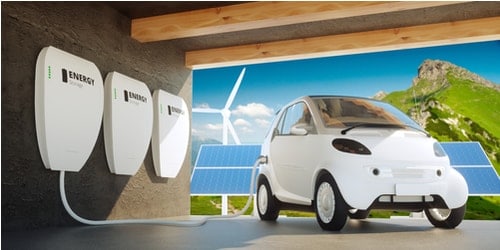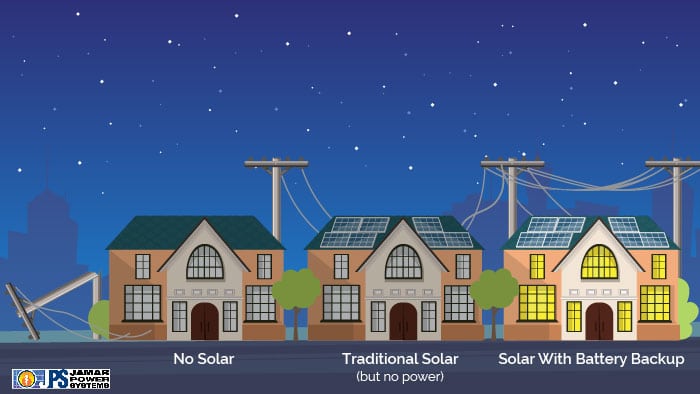Solar Batteries To Keep The Power On
Do you want or need electricity even when the utility company has a power outage?
It’s no fun when the power goes out. For some, it can be downright dangerous, threatening people’s lives, valuables, and many businesses.
The good news with today’s solar energy storage technology you can choose to free yourself of the concern for electric power outages.
Today, you can be energy independent!
A properly sized solar battery backup system for your home can protect you from electric utility power outages and provide you the peace of mind of knowing electric power is ready at all times.
What are the benefits of a battery backup system for the home?
There are many reasons why homeowners may wish to protect themselves from electric utility blackouts, here are just a few:
- medical equipment needed
- running a business from home
- freezer storage
- heat and hot water needed
- reduce reliance on the electric grid
- preparation for natural disasters
Wide-scale power outages in California became a common event as a result of an aging electric grid that needs upgrading.
In addition, natural events are always a threat to the power grid; high winds, lightning storms, hail, ice, snow, falling trees, floods, fires, and exposed power lines can all cut electric grid power at any time.
Three electricity backup solutions that can protect you from power outages:
- a portable fuel generator (limited to fuel storage, requires manual turn-on).
- a foundation-tied generator (tied into the natural gas line and indefinite fuel supply as long as utility natural gas supply is available).
- solar power with battery storage and controls (automatic switch, provides the energy you designed for indefinitely).
Generators are an alternative, but the portable ones require manual starting (maybe at night, in the dark) and only provide for short-term minimal critical load backup power. They also need fuel storage and are limited to the amount of fuel you have stored.
Fixed, foundation, or “pad-mounted” generators that are tied into the natural gas utility come with high costs and require city permits due to the noise they create while running.
If you’re going to spend that kind of money, then you should compare it first to a solar energy system with battery backup, which can provide backup energy indefinitely without any need for fuel or fuel storage tanks.

Can solar energy be stored in batteries?
Yes, the good news is there are solar energy storage systems that can provide reliable backup electric power for days, weeks, or as long as you need or want it (depending on its design).
It may come as a surprise to many, but a traditional solar energy system with standard inverters and no battery storage will shut OFF if the electric grid goes down.
Two reasons traditional solar energy systems shut down during a power outage are:
- it prevents power from going into the grid and electrocuting utility technicians working on the grid.
- the inverter relies on the grid to complete it’s circuit and cannot operate without it.
A solar power system can continue to operate in the event of a utility power outage only if the system includes energy storage (batteries) and energy control (smart inverter and controller).
The smart inverters and controller are required to isolate the home as it’s own independent grid once it senses the utility grid has gone down.
How does battery storage work with solar?
The smart inverters and controller monitor where the energy to power your home is coming from (grid, solar panels, or batteries), and when to charge the batteries.
With a solar energy system charging the batteries by day and then using that energy by night, utility power outages can become a thing of the past.
Systems are scalable and can be added to if future electric needs grow (electric vehicles, pools, spas, etc.).
Proper design can provide for little to no use of utility company electricity.
Are whole house battery systems worth it?
The benefits of rooftop solar with backup battery storage include:
- Backup power for critical loads
- Quiet operation
- Peak rate shaving
- Reduce non-by-passable charges
- Eligible for self-generation incentive program SGIP rebates. (see https://www.cpuc.ca.gov/sgip/)
Back up power for critical loads – have electric power ready at all times even if there’s a utility company blackout. You can choose storage systems that power only essential loads to those that provide for full daily loads.
Offset Peak Prices – to qualify for the federal tax credit, backup battery power systems are programmed to charge from any excess solar energy during the day when utility rates are low, and to discharge in the evening when utility rates are high.
If any of those things are important to you, then yes, solar battery storage systems are worth it.
Can I power everything in my home with a solar battery backup system?
The reality of it comes down to your actual needs, desires, and budget. Due to costs, most battery backup systems are designed to power only essential loads during a power outage. You can, however, power whatever your heart desires if your budget is big enough.
What are the best batteries for solar power?
Deep cycle lead-acid or gel batteries

In years past, lead-acid or gel batteries were used to create off-grid or battery backup energy systems. This is the same technology used in your automobile’s battery.
Lead-acid battery backup systems are complicated to install, have short life-spans (10 years or less), require a fair amount of maintenance, require proper ventilation to release the gases they create and are costly to install.
Also, few solar contractors know how to properly size and configure battery storage systems using lead-acid batteries.
Today, Lithium Ion or Lithium Iron batteries are the preferred solution to energy storage systems for homes.
Lithium-ion batteries

Lithium ion batteries are the same technology used to power your smartphone and electric vehicles. As a result of their popularity, the costs of these batteries have reduced significantly in recent years.
Lithium is a lightweight metal that easily conducts electricity and allows for the storage of electrical energy. They can store more energy per square inch than lead-acid batteries so they’ll take up less room, and they can hold their charge longer also.
A solar battery backup system using Lithium batteries is the most cost-effective way to provide you with solar energy storage.
The U.S. Department of Energy recommends the use of lithium ion batteries for solar energy storage. To learn more visit their website page on Solar Energy Storage Solutions.
How long do solar batteries last?
Most lead-acid batteries provide a five to ten-year useful life warranty.
Most lithium battery storage systems for solar systems provide a ten-year warranty and usually last longer.
For more info, see our article, “How Long Do Solar Batteries Last?“
How many batteries do you need for a solar panel system?
Step one would be to determine how much energy your household is currently using, and what amount of that is for critical loads you absolutely must have in case of a power outage. That data will help in correctly sizing the battery power system you’ll need.
The best way to know your critical load figures is to install an energy use monitoring system that details exactly how much energy each electrical appliance in your home is using.
To accomplish that, we recommend first installing the simple and affordable Wiser Energy smart home monitoring device. It captures how many watts each of your appliances are using every day. This takes the guesswork out of calculating the power your home needs in case of a utility blackout.
Are there tax credits or rebates for solar battery systems?
Yes, solar battery systems that are charged by solar energy systems are eligible for federal income tax credits of 30 percent until 12/31/2025. *Updated by Congress in 2025.
[2025 UPDATE] THESE TAX CREDITS NOW END ON DECEMBER 31, 2025 as a result of the 2025 Budget Reconciliation Bill passed by Congress and signed by the President July 4, 2025.
California may also provide rebates may be available for battery backup systems.
In 2001, the California Public Utilities Commission (CPUC) enacted a Self-Generated Incentive Program (SGIP) that provides rebates for installing energy storage technology.
In 2020, the CPUC authorized funding for more than $1 billion in SGIP rebates for installations of battery backup power systems for organizations, small businesses, and homeowners.
SGIP rebates range from providing between 25 and nearly 100 percent of the costs of battery storage systems, depending on several factors. Eligibility is based on one or more of the following conditions:
1) if you’ve notified your utility company that you have a serious illness or life-threatening conditions.
2) if you’re currently enrolled in a utility Medical Baseline program.
3) if your property is in a high fire-threat area.
4) if your property has experienced two or more Public Safety Power Shutoffs (PSPS).
5) if your property has resale restrictions or is located in a designated disadvantaged community (DAC).
6) if your property relies on electric pump wells for water.
7) and other criteria.
More information, download the CA brochure on the SGIP program.
A solar energy system is not required for SGIP rebates. Battery backup systems can operate by storing utility power for emergency use. SGIP rebate funds are available until they run out.
We are proud to be certified installers of:
Related articles:
2025 Federal tax credit changes for solar & solar batteries
Solar panel monitoring service
Battery storage system fundamentals
Peak Shaving: Invest in your home’s energy future for significant ROI
Why a battery makes financial sense with solar panels now under NEM 3.0
How long will a solar battery last during a power blackout?
How many batteries are needed to power your home?
How many years do solar batteries last?
Solar Battery or generator for emergency backup power?
How to check if your solar panels are charging the solar battery
Complete Guide to Solar PPA, Lease vs Buying Solar
How to choose a solar installer
Get a FREE solar anaylsis to see if solar energy or a battery is right for your home
Contact us today to discuss solar energy storage solutions for your home.
Our Service Area
- 2025 Federal Tax Credit Changes For Solar Panel Systems & Solar Batteries - July 8, 2025
- How Solar Batteries Work - March 4, 2024
- Solar Battery or Generator for Emergency Backup Power? - January 30, 2024





Hi Paul. Thanks for the comments. No, we no longer install generators. Call (619) 448-7770 and ask for company owner Phil Edwards to find out why and why you should know.
Great article!
Do you install slab mounted generator ?